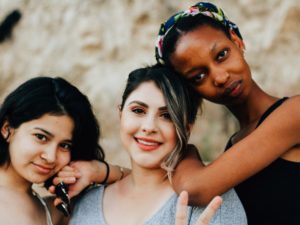Obscurities are shifting. Or, at least recently, injustices are interrupting. Complex issues are being considered. Communities with histories of hiddenness have an opportunity to be heard. It remains to be seen if prominence will be proportionately passed among the people. Indeed, all individuals and groups are in a measure misunderstood. But some more than others bear a great cost of marginalization, of being obscure and unseen.
I am not one of those people. As someone who looks and sounds like the majority culture, I’ve experienced a minimal amount of marginalization in society by being so similar. My voice is “normal” and thus welcomed. Yet others—by no fault of their own—carry a different voice, and find themselves on the fringes. I see the tremendous weight of unheard hiddenness. For the sake of those on the margins, I want a greater variety of voices to be valued. But then I must accept that I am not the archetype. The definition of “regular” will need to be redrawn if racism is to be resisted. It’s not that my utterances are unwanted, but as in sound mixing, they ought to be in equilibrium. We need the bass, the bugle, and the background vocals balanced. And probably more cowbell.
The definition of “regular” will need to be redrawn if racism is to be resisted.
I am willing to fade towards the background that others may move towards the foreground. I am willing to become more obscure, provided that it is a True Obscurity and not a False Obscurity.
What is True Obscurity? It prioritizes platforming people—other people. It is a desire for all to be heard as much as I am, irrespective of how hearing new things may lead to personal discomfort.
When I live in True Obscurity, what matters—especially towards those who are not like me—is my character, my attitudes, and my private thoughts. However, even though these matter deeply, True Obscurity recognizes the ragged reality of my inner dialogue. It gives room for the journey towards wholeness. My best self doesn’t need to be flaunted over social media, but can be actively tucked away, unknown except to God. It is humble hiddenness in hope.
True Obscurity gives room for the journey towards wholeness.
What is False Obscurity? It is self-absorption, even when interacting with others. It is when my awareness is dialled in on my own image-management, trying to voice the “right” things, without actually sharing my voice’s value.
False Obscurity attempts to meet the social expectations of others, by caring most about my actions, my words, and my visible displays of wholeness NOW—as if transformation can happen overnight. In some ways it can: I can quickly hide the worst, most selfish parts of my life, and only emphasize the best, the most “caring.” But it will be a False Obscurity that is actually about me, and not about inviting others forward. It is a desperate display, often in despair.
I’ve been tempted lately to frantically react to the conversations I hear on social media and the things I see in the news with a quick-fix False Obscurity. Fear and shame are pretty persuasive. And my own brokenness—that inability to be all that I was meant to be—makes it hard not to default to False Obscurity. Sometimes it’s all I can do.
So how to get to True Obscurity? The only way I know is to be motivated by love—love not just for those I currently can hear clearly, but also for those whose voices are unknown and obscured to me. When I love and think of others more than myself, I can become eager to platform their voices, even if it makes my majority smaller. But again, how to get to love?
I don’t think you can love until you know you are truly loved. For me, this source of love is Jesus Christ. He lived the Truest of True Obscurity, modelling what it is like to share his voice with others. Not only did he leave the glory of heaven on my behalf, but he descended to the full obscurity of death so that I can share his resurrection fame: hearing and being heard by God.
Of course, even while I try to live out True Obscurity, I often end up falling into False Obscurity. I bounce back and forth, living more Truly or more Falsely. Sometimes it feels foggy as to where I am on the spectrum of attending more to myself or to others. But Jesus is committed, continuing to call to True Obscurity. So be patient with me—I’m learning!
Jesus is committed, continuing to call to True Obscurity.
The tricky thing is, from the outside, you may not be able to tell if I’m living in True or False Obscurity. The same words or actions can fit into either category. Posting on social media could genuinely be giving voice to the unheard—or it may just be me and my murmuring. Reading an alternative angle might let someone else sing, but not if I’m engaging just to have something to sling back at the speaker.
But our motives will not always be so obscure: one day I will be fully known to you and you to me. This is why True Obscurity operates in hope. It understands that one can’t actually be fully known now, so it accepts misunderstanding, waiting for God’s validation. And this is why False Obscurity operates in despair. It demands to be fully known, understood, and externally validated now, yet in reality, each of us must wait in our varying degrees of obscurity for the time being—a sure frustration for the Falsely Obscure.
One day I will be fully known to you and you to me.
So I take the obscurity that’s True. It is good not just in this moment of tangible tension as protests prolong, but as a way of life. For somewhere in this True Obscurity, Jesus is offering True Life.
"*" indicates required fields





